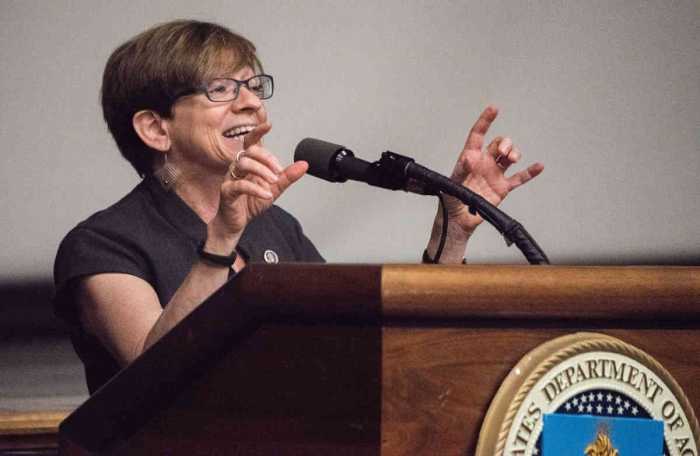Two federal trial courts have allowed Title VII employment discrimination claims by law enforcement officers, one gay and the other transgender, to proceed over the protests of the government agencies where they worked.
On October 4, US District Judge Jennifer A. Dorsey granted summary judgment to Bradley Roberts, a transgender man employed as a police officer by the Clark County School District in Nevada, on his claim of gender discrimination in violation of both Title VII and the Nevada Equal Rights Law. Dorsey referred other claims, involving harassment and retaliation, to a magistrate judge for trial.
On October 7, Chief US Magistrate Judge John E. Ott of the Northern District of Alabama denied the City of Pleasant Grove’s motion to dismiss a Title VII claim by an openly gay man, Lance Smith, who had been discharged from the city’s police department.
Federal courts in Nevada, Alabama accept sex stereotyping theory in employment bias cases
In both cases, the judges referred to the Supreme Court’s 1989 decision, Price Waterhouse v. Hopkins, which endorsed the view that employees who suffer adverse consequences because of their failure to comply with the employer’s sex-stereotypical views can sue for sex discrimination under Title VII of the 1964 Civil Rights Act.
In 2012, the Equal Employment Opportunity Commission (EEOC), the federal agency that enforces Title VII, issued an administrative decision finding that the statute forbids gender identity discrimination, and the EEOC issued a similar ruling regarding sexual orientation discrimination in 2015.
The EEOC rulings relied on and extended the sex-stereotyping theory from the Price Waterhouse case. The agency’s rulings are not binding on the federal courts, but trial judges have begun over the past year to acknowledge them and, in some cases, to follow their reasoning.
The Clark County School District first hired Bradley Roberts as a campus monitor in 1992, when he was known by a female name and hoped to become a police officer. Roberts graduated from a law enforcement academy in 1994 and was upgraded to a police officer position, which he held without incident for 17 years until he began to transition.
In 2011, Roberts began identifying himself as a man and dressing and grooming accordingly. When he began using the men’s bathroom at work, other officers complained, and when his commanding officers confronted him for an explanation, he explained he was transgender and in the process of transitioning. He said he wanted to be known as Bradley Roberts and to use the men’s bathrooms. Officials told him he could not do so, but that because he now appeared as a man he should also refrain from using the women’s bathrooms. He was instructed to use gender-neutral bathrooms in the district’s schools “to avoid any future complaints.”
Roberts then sent a letter to his superiors summarizing what he had told them and again expressing his desire to be called Bradley Roberts and for co-workers to use male pronouns in referring to him. He pledged to comply with the men’s grooming code for the district’s police force.
That letter prompted another meeting with his superiors and his union representative, where he was again denied access to the men’s bathrooms and told he would not be referred to as a man or allowed to use the men’s bathrooms until he could provide official documentation of a name and sex change. Two days later, officials relented somewhat, saying he could use the name Bradley Roberts informally but not on any “official and formal documents.”
Roberts’ supervisors then sent him a proposed memo summarizing these arrangements and included his concern that co-workers and commanding officers be cautioned that asking “below the belt” questions about his anatomy “may constitute sexual harassment.” Roberts was “blindsided” when that memo was emailed to everyone in the department — rather than just managers — and generated questions and what he considered harassment from some co-workers.
In December 2011, Roberts submitted paperwork to the district showing he had legally changed his name and his driver’s license, which resulted in another email to the entire department explaining that. In spite of that high visibility attention, the new health insurance card he received in 2012 still listed him as “female.”
At that point, Roberts filed a discrimination complaint with the Nevada Equal Rights Commission, alleging gender identity discrimination in violation of state law. He cited the bathroom ban as discriminatory, and described several incidents, including the meetings with supervisors, as harassment.
The district refused to participate in mediation with the Commission, but did issue a new policy allowing Roberts to use the men’s bathrooms. The Commission then closed the case as “moot,” but he filed a second complaint, again citing the bathroom ban as well as offensive comments from co-workers and the department-wide emails that had essentially “outed” him. He also alleged retaliation for filing the earlier charges. The federal EEOC ultimately issued him a “right-to-sue” letter and he brought his case against the district in federal court.
Judge Dorsey undertook a thorough historical review of the treatment of gender identity under Title VII, emphasizing how the Ninth Circuit Court of Appeals, which has jurisdiction over Nevada federal courts, has embraced a broad understanding of sex discrimination under Title VII and other federal laws, such as the Violence Against Women Act. She also pointed to the growing body of post-Price Waterhouse decisions nationwide allowing gender identity claims under Title VII using a sex stereotyping theory, as well the EEOC’s 2012 and 2015 decisions.
“I join the weight of authority and hold that discrimination against a person based on transgender status is discrimination ‘because of sex’ under Title VII,” she wrote, concluding that Roberts was entitled to summary judgment on his sex discrimination claims because it was clear he had suffered discrimination on that basis.
“Direct evidence established the department’s discriminatory intent here,” Dorsey wrote. “It banned Roberts from the women’s bathroom because he no longer behaved like a woman. This alone shows that the school district discriminated against Roberts based on his gender and sex stereotypes. And the department also admits that it banned Roberts from the men’s bathroom because he is biologically female. Although [the district] contends that it discriminated against Roberts based on his genitalia, not his status as a transgender person, this is a distinction without a difference here.”
The district, the judge concluded, failed to articulate a legitimate non-discriminatory reason for restricting his bathroom use.
On Roberts’ harassment and retaliation claims, Dorsey concluded that factual disputes about the severity and impact of those incidents required further proceedings in front of a magistrate.
The Smith case in Alabama involves straightforward sexual orientation discrimination by a local police department. Lance Smith interviewed with Lieutenant Jennifer Fredrick for a position in the Pleasant Grove Police Department in 2014. After she told him he would be offered a position at a specific salary, Smith told Fredrick that he is gay and has a same-sex partner. Fredrick’s demeanor immediately changed, Smith said, and she advised him to “reconsider” his desire to work in the department. Subsequently, however, Smith received an email from Fredrick informing him that “his homosexuality would not be an issue,” wrote Judge Ott. Subsequent events, however, showed this was untrue.
After Smith completed the required physical exam, he was directed to meet with the police chief, Robert Knight, who told him he would receive a lower salary than he had been promised — and $5,000 less than other new recruits. Smith claims he received only two weeks of field training instead of the three normally provided to new recruits, and then was assigned to a night shift patrol on his own rather than the usual assignment for new officers to patrol with a partner.
Smith also claims he was informed by the night shift sergeant that “Lt. Fredrick had instructed the sergeant to write down everything Smith did wrong so Lt. Fredrick could fire him.” Smith says another officer warned him to be “careful” because a police corporal was a “homophobe.”
After a few months, Fredrick told Smith he was “not going to work out” and needed to resign, but refused to tell him what he had done wrong. In fact, he claims, she told him he was a good officer and would find another department that would be a better “fit.” Fredrick gave him a prepared resignation letter and told him he would be fired if he did not sign it. Smith signed the letter, but when he attempted to find police work elsewhere in the county, he learned that Knight and Fredrick, contrary to the assurances he received, had “falsely reported that he was an unsatisfactory employee.”
Smith filed a sex discrimination charge with the EEOC, which issued him a “right-to-sue” letter, and he filed his case, alleging violation of Title VII and his equal protection rights, on March 1 of this year. The city moved to dismiss on grounds including the claim that Title VII does not apply.
Acknowledging that the 11th Circuit “traditionally” does not recognize Title VII remedies for sexual orientation discrimination, Ott pointed to the EEOC conclusion on sexual orientation discrimination from 2015 and the fact that “at least one court in this circuit, noting that the question is an ‘open one,’” had agreed.
More importantly, wrote Ott, “Smith has also alleged discrimination based on his failure to conform to sex and gender stereotypes.” Ott rejected Smith’s argument that discrimination based on his association with his male partner is prohibited sex discrimination, but found that the 11th Circuit had accepted a broad view of sex discrimination in a 2011 case involving a transgender state employee asserting an equal protection claim.
Ott specifically cited Smith’s allegation that he was told on the job that “‘men should be men,’ which led him to conclude that other members of the department did not feel that he was ‘manly’ enough to be a police officer. He also alleges that other officers made jokes about his attire and mannerisms.”
Ott also refused to dismiss Smith’s claim against Chief Knight and Lieutenant Fredrick in their individual capacities for “interference with a contractual or business relationship” in filing false official paperwork that Smith was “an unsatisfactory employee.” The judge, however, found that Smith had not made sufficient factual allegations to support his claim that the city should be held liable for an “official custom or policy” of discrimination.
Bradley Roberts is represented by Jason Maier of Las Vegas, with amicus assistance from Lambda Legal staff attorneys. Lance Smith is represented by Cynthia Wilkinson of Birmingham, Alabama.
Dorsey was appointed to the federal bench by President Barack Obama. Ott was appointed by President Bill Clinton.
In a related development, the Chicago-based Seventh Circuit Court of Appeals this week agreed to an en banc rehearing by all of the circuit’s judges of a July three-judge panel ruling that rejected a sexual orientation discrimination claim under Title VII raised by Kimberly Hively, a community college instructor in South Bend, Indiana. The panel deferred to existing circuit precedent that holds that such claims are not recognized under Title VII, but two of the three judges stated their view that the circuit precedent should be reexamined. Lambda Legal is representing Hively.

































